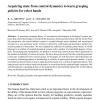Free Online Productivity Tools
i2Speak
i2Symbol
i2OCR
iTex2Img
iWeb2Print
iWeb2Shot
i2Type
iPdf2Split
iPdf2Merge
i2Bopomofo
i2Arabic
i2Style
i2Image
i2PDF
iLatex2Rtf
Sci2ools
AR
2002
2002
Acquiring state from control dynamics to learn grasping policies for robot hands
Abstract--A prominent emerging theory of sensorimotor development in biological systems proposes that control knowledge is encoded in the dynamics of physical interaction with the world. From this perspective, the musculoskeletal system is coupled through sensor feedback and neurological structure to a non-stationary world. Control is derived by reinforcing and learning to predict constructive patterns of interaction. We have adopted the traditions of dynamic pattern theory in which behavior is an artifact of coupled dynamical systems with a number of controllable degrees of freedom. For grasping and manipulation, we propose a closed-loop control process that is parametric in the number and identity of contact resources. We have shown previously that this controllergenerates a necessary condition for force closure grasps. In this paper, we will show how control decisions can be made by estimating patterns of membership in a family of prototypical dynamic models. A grasp controllercan t...
Related Content
| Added | 16 Dec 2010 |
| Updated | 16 Dec 2010 |
| Type | Journal |
| Year | 2002 |
| Where | AR |
| Authors | Roderic A. Grupen, Jefferson A. Coelho Jr. |
Comments (0)

